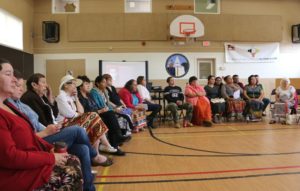Murdered and Missing Indigenous Women and Girls remembered and honoured

By Laura Barrios
NORTH BAY—Citizens from all facets of the North Bay and area community gathered at the North Bay Indian Friendship Centre on October 4, for a Sisters In Spirit Vigil to support families who have lost a loved one and to raise awareness about this prevalent issue.
October 4 is recognized as the day where the lives of Missing and Murdered Indigenous Women and Girls are honoured. The vigil held at the North Bay Indian Friendship Centre was to honour the 1181 Indigenous women that have been murdered or remain missing in Canada between 1980 and 2012 (according to the Royal Canadian Mounted Police), among the growing number presently.
“Frankly, 1,200 missing [women and girls] is absurd,” stated Beth Hewson, an Anglican Minister at St. Simons in Temagami, Ontario, Chaplin at the North Bay Regional Health Centre, and attendee of the vigil. “When they are telling these stories, it’s so out of my experiences. It’s just not right. It’s not right. It shouldn’t be happening…it blows me away.”
The vigil began with a smudging ceremony and an opening prayer by Lorraine Whiteduck-Liberty, a Nipissing First Nation member, Grandmother, and resource person at the North Bay Indian Friendship Centre.
“We smudged our body, our minds; we brought that medicine towards our heart so it can be open, our mind could be open, and brush away our distractions before coming here and focusing on what we are about to do in this ceremony for our sisters,” stated Whiteduck-Liberty. “I send out my thoughts to the women that have gone through that eastern doorway. I want to acknowledge each and every one of them. They are our sisters, grandmothers, aunties, nieces, cousins.”
Various community partners joined from around the North Bay and surrounding area, such as representatives from Amelia Rising Sexual Assault Centre of Nipissing, Union of Ontario Indians, and the United Church.
“It’s so important for us to recognize and honour these women at this time, but not only today, but [every day]. So many of these women, even though we may not know them personally, they are part of us; they are part of our families,” stated Katherine Sarazin, Board President of the North Bay Indian Friendship Centre. “For those of us who do not have personal connections to these women, it just takes a moment to imagine one of your children being lost and you feel that connection.”
Special guest Elwood Ashawasegai, a traditional person and member of the Rain Dance Lodge and community member from Henvey Inlet First Nation, shared his lived experience about his mother and sister being among the many women who have lost their lives.
“I’d like to speak about my mother and my sister who were murdered in 1995. I miss them every day,” noted Ashawasegai. “It was difficult to speak of it in my infancy [but] my mother [and sister] were very strong, strong women…[they] gave me the strength and courage to move on.”
Ashawasegai shared the difficulty in coping with the loss of both his mother and sister, and later his aunt, but opened up about his own personal experience with violence.
“I am a survivor of sexual abuse, from both a man and a woman,” admitted Ashawasegai. “[But] if I didn’t forgive, I would still be struggling, I would still be out on the streets being ashamed.”
His father taught him about forgiveness and its importance in life in order to truly heal and recover.
“My father taught me to forgive in order to move on,” noted Ashawasegai, when discussing how he forgave those who abused him and his family. “I’m at the stage of forgiveness in my healing journey.”
“I’m very happy that I came here today to talk about my experiences. If we can help one person a day, you’re doing good. If you can help two people a day, you’re doing awesome. If you’re helping multiple people a day, you’re doing great work,” continued Ashawasegai. “…We have to listen in order to learn, recover, to love and share that love.”
Ashawasegai’s testimonial on the loss of his mother and sister provided insight on this pressing issue to all attendees which they can now share what they have learned with others.
“This is an important subject that we really need to pay attention to. We’re going to hear those testimonies and we’re going to be able to honour those families,” stated May Recollet-Goulais, staff member at the North Bay Indian Friendship Center and coordinator of the vigil. “We have to get out into our community and inform others about our realities…we have to educate the community.”
“We’re not powerless,” stated Adrienne Pelletier, Social department Director at the Union of Ontario Indians. “…Try to get more informed about the issue and also taking the perspective of being non-judgmental and supporting the women.”
“I try to come to this event every year and I come out of wanting to stand in solidarity with Indigenous women and families,” stated Teresa Jones, United Church Minister. “I go back to the people that I see on an almost daily basis and I take back what I’m learning and I share it.”
“Many [Indigenous] women are being touched by this experience. I believe to my core this is a blatant example of colonialism,” Brenda Quenneville, Executive Director at Amelia Rising. “This phenomenon isn’t something that’s in our history; it’s still happening and we’re absolutely fighting back.”
The vigil concluded with the Elders of the Lifelong Care Program presenting their special blanket created in honour of the Murdered and Missing Indigenous Women and Girls, traditional drumming and group singing, a light lunch, and an opportunity to share stories and make new connections.


